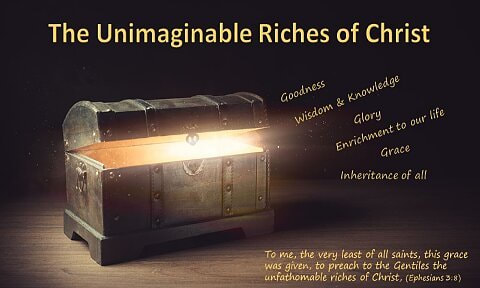comes from Ephesians 3:8–9:
“To me, though I am the very least of all the saints, this grace was given, to preach to the Gentiles the unsearchable riches of Christ, and to bring to light for everyone what is the plan
of the mystery hidden for ages in God,
who created all things” (ESV).
The Greek for “unsearchable riches” is translated “boundless riches”
The Greek word translated “unsearchable” describes something that cannot be fully comprehended or explored. In other words, there is no limit to the riches of Christ; they are past finding out. Try as we might, we can never plumb the depths of Christ’s worth. Paul delineates some of these riches in Ephesians 1:7–14: redemption through His blood, the forgiveness of sins, the knowledge of the mystery of His will, the message of truth, the sealing of the Holy Spirit, and the guarantee of our inheritance. These are spiritual riches with eternal benefits, and we cannot fully comprehend them.
Jesus taught two short parables that emphasize the value of eternal life and the kingdom of God: “The kingdom of heaven is like treasure hidden in a field. When a man found it, he hid it again, and then in his joy went and sold all he had and bought that field. Again, the kingdom of heaven is like a merchant looking for fine pearls. When he found one of great value, he went away and sold everything he had and bought it” (Matthew 13:44–46). Like a hidden treasure or a pearl of great price, admission to the kingdom is of incalculable worth—and it is Jesus Christ who grants the admission. The unsearchable riches of Christ are on display in every believer’s heart.
The unsearchable riches of Christ cannot be fully traced out. “In Christ all the fullness of the Deity lives in bodily form” (Colossians 2:9), so the riches of Christ include all that God is. The unsearchable riches of Christ are the Glory of God, the Truth of God, the Wisdom of God, the Life of God, and the Love of God. In Christ, God “has blessed us in the heavenly realms with every spiritual blessing” (Ephesians 1:3). In Christ are hidden “all the treasures of wisdom and knowledge” (Colossians 2:3). In Christ, God “has given us everything we need for a godly life” (2 Peter 1:3).
In Ephesians 3:8 Paul refers to himself as “less than the least of all the Lord’s people.” This humble statement is then contrasted with “the boundless riches of Christ.” Paul describes himself as the lowest of believers while lifting Jesus up as the greatest of all. Every believer, in like humility, acknowledges the all-surpassing goodness and grace of God: “The LORD bestows favor and honor; no good thing does he withhold from those whose walk is blameless” (Psalm 84:11).
Christ’s riches that He makes available to us
are not material but spiritual.
The unsearchable riches of Christ provide salvation to everyone who believes (John 3:16; Romans 1:16). We may be the worst of sinners, yet Jesus can forgive us and transform our lives (Romans 12:1–2). It is the gift that truly keeps on giving, as we are changed, by God’s Spirit, into “loving, happy, peaceful, patient, kind, good, faithful, gentle, and self-controlled” people (Galatians 5:22–23, CEV).
King Solomon was a man of great riches and wisdom, and his fame spread throughout the known world. Dignitaries from other countries came to hear his wisdom and see his lavish display of wealth (1 Kings 10:24).
Scripture says that Solomon had no equal in the earth at that time: “King Solomon was greater in
riches and wisdom than all the other kings of the earth”
(verse 23).
Yet, for all that, Solomon’s riches were not unsearchable.
They could be quantified; the gold bars could be counted, and he had no inexhaustible supply of silver. Besides that, Solomon’s riches were only the temporal treasures of this world.
Jesus is “greater than Solomon”
(Luke 11:31).
The treasures of Christ are inexhaustible,
they are unsearchable,
and they are forever.
The apostle Paul never missed a teaching opportunity.
In Ephesians 3:1–13, he interrupted his own prayer to expound on the divine mystery of God revealed in the
New Testament church of Jesus Christ.
The previously hidden secret was now made known—both Jews and Gentiles would
share equally in the gospel of salvation
(verse 6).
God had a specific purpose for using the church in this way: “His intent was that now, through the church, the manifold wisdom of God should be made known to the rulers and authorities in the heavenly realms, according to his eternal purpose that he accomplished in
Christ Jesus our Lord” (Ephesians 3:10–11).
The word translated “manifold” in Ephesians 3:10 means “many and varied; having many features and forms; wrought in various colors; diversified, intricate, complex, many-sided.”
God’s wisdom
in His extraordinary plan of salvation,
as seen in the new and mysterious creation of the church,
is a multi-faceted, many-colored,
culturally diverse, rich, and
beautiful community of believers.
There is no other human co-op like it in the world.
According to Bible commentators,
“the manifold wisdom of God”
is a poetic and artistic expression
suggesting the intricate nature of an embroidered pattern
as in Joseph’s “tunic of many colors” (Genesis 37:3, NKJV).
Each member of the body of Christ manifests a different aspect of God’s image (Genesis 1:26–27; James 3:9; Ephesians 4:24).
Together, believers form a perfect blend of harmony and diversity.
The many features, forms, and colors of fellowship in the church reflect the manifold wisdom of God.
For the earliest Christians, and particularly the Jews, the up-to-that-time secret mystery of the church was truly a mind-blowing revelation. Even “the unseen rulers and authorities in the heavenly places” were learning about it for the first time. To the Romans, Paul declared, “Oh, how great are God’s riches and wisdom and knowledge! How impossible it is for us to understand his decisions and his ways!” (Romans 11:33, NLT).
Paul referred to the church as “the mystery that has been kept hidden for ages and generations, but is now disclosed to the Lord’s people. To them, God has chosen to make known among the Gentiles the glorious riches of this mystery, which is Christ in you, the hope of glory” (Colossians 1:26–27).
God’s mystery is Christ “in whom are hidden all the treasures of wisdom and knowledge” (Colossians 2:3). Jesus possesses the manifold wisdom of God (1 Corinthians 1:24, 30) and reveals it to the world through His body, the church. We have Christ in us—the hope of glory. It still astonishes and overwhelms that God has chosen to package the treasure of His manifold wisdom in fragile, human “jars of clay” (2 Corinthians 4:7–11).
The Bible reveals the manifold wisdom of God as
unsearchable, deep, and beyond measure
(Isaiah 40:28; Psalm 92:5; 147:5).
James describes it as “wisdom from above,” which is “first of all pure. It is also peace loving, gentle at all times, and willing to yield to others. It is full of mercy and the fruit of good deeds. It shows no favoritism and is always sincere” (James 3:17, NLT). On the other hand, human wisdom has no merit of its own (1 Corinthians 1:19–21; Isaiah 29:14).
Nevertheless, God gives His wisdom to humans as a gift
(Proverbs 2:6; 1 Corinthians 2:6–16; James 1:5), and His followers are to continue praying and asking Him for spiritual wisdom (Colossians 1:9).
As believers, we can picture the manifold wisdom of God as a global, body of Christ-shaped tapestry.
Our individual lives are the various colored threads woven together in unity of purpose—to display God’s manifold wisdom through the church.
We do this by taking the good news of salvation in Jesus Christ to all the people of the world.


 RSS Feed
RSS Feed
























































